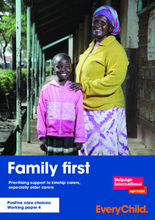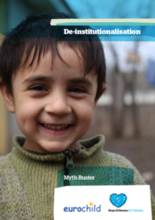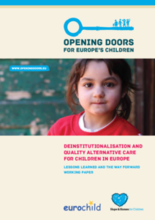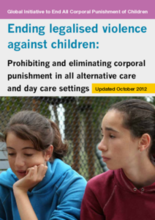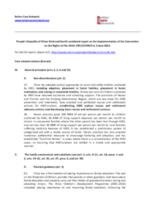Displaying 501 - 510 of 608
The paper calls for greater prioritisation to be given to supporting kinship carers and the children in their care, including ensuring such households are able to access social protection, and receive psycho-social and health care support and assistance with education where needed.
This briefing paper seeks to address key misunderstandings about de-institutionalisation. It explains what it is and what it is not and addresses key questions often asked about the need for such institutions, the role they play and the impact of this transformation and what it entails.
This paper aims to raise awareness on the perverse effects of institutionalisation on children and it calls for comprehensive system reforms, starting with a transition towards family and community-based care. It highlights country level lessons learnt in the European context that demonstrate how deinstitutionalisation can be achieved in practice.
The report provides guidance on achieving law reform which gives children in alternative care and day care the protection from all forms of corporal and other cruel and degrading punishment that is their absolute right.
This report from the Annie E. Casey Foundation assesses the practice of kinship care within the United States, reflecting upon the widespread use of this care practice, the complexities facing families involved in this form of care and the interventions and supports proven to assist in its success. While specific to the United States, discussions and recommendations can be assessed for application in other global settings.
This paper describes a study that assessed the attitudes of people in the Hashemite Kingdom of Jordan toward the implementation of foster care as an alternative to institutions for children.
The People’s Republic of China issued its third and fourth combined report on the implementation of the Convention on the Rights of the Child in June 2012. This extract of the report focuses on sections relevant to children's care and in particular those addressing Family Environment and Alternative Care
This paper presents findings from the first-ever study of kinship care in the UK using census micro data.
On May 2, 2012, in preparation of the Family Strengthening and Alternative Care Conference for Francophone Sub-Saharan Africa in Dakar, Senegal, BCN and the regional planning committee convened experts and practitioners to present and discuss the efforts to implement the Guidelines for the Alternative Care in the region. Watch this video for presentations, country level experience from Togo, and discussions on the pressing issues facing implementation in the region.
This comprehensive policy report by the Annie E. Casey Foundation summarizes what is known about kinship care in the United States, identifies the problems and issues these families face, and recommends how best to support caregivers as they step up to take responsibility for children in their extended families and communities.

